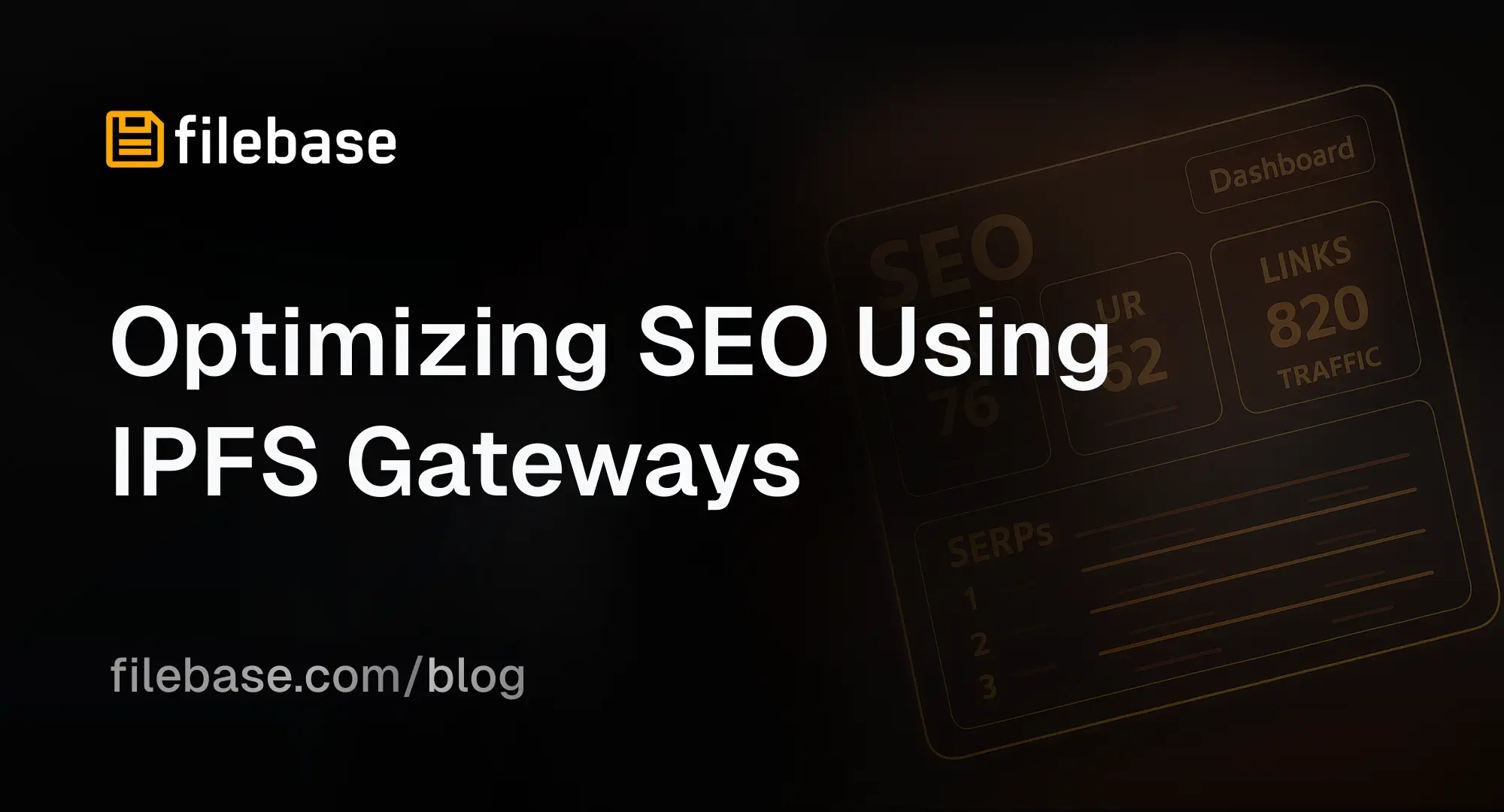Optimizing SEO Using IPFS Gateways

Why SEO Still Matters in a Decentralized Web
We’re watching the internet decentralize in real-time. IPFS has become a foundational layer for how data is stored, verified, and shared—especially across NFT marketplaces, dApps, and content-driven platforms.
But here’s the reality: if your content can’t be found, it might as well not exist. Search Engine Optimization (SEO) remains critical—even for decentralized content.
This raises a key question: How do you make IPFS-hosted content discoverable on traditional search engines like Google and Bing?
The answer: IPFS gateways.
Gateways like the ones operated by Filebase act as HTTP bridges to IPFS, enabling standard browsers and search engines to access decentralized content without needing to run an IPFS node. They’re the missing link between the dWeb and the discoverability of the traditional web.
In this post, we’ll explore how you can use IPFS gateways to make your decentralized content indexable, searchable, and fast—without compromising on the benefits of decentralization.
The SEO Challenges of IPFS
IPFS works differently from the traditional web. It uses content-based addressing (via CIDs) rather than location-based URLs. That’s great for permanence—but not always great for SEO.
Here’s what you’re up against:
- No central index: Search engines don’t crawl the IPFS network natively.
- Unfriendly URLs: Raw CIDs are long, unreadable, and scattered across different gateways.
- Duplicate content risk: The same content can be accessed via multiple gateway URLs (e.g.
ipfs.io,nftstorage.link), which can dilute SEO value. - Lack of server data: IPFS doesn’t generate traditional server logs, which makes analytics and SEO tooling harder.
That’s why IPFS content needs to be routed through gateways, ideally with consistent URLs, canonical tagging, and performance tuning in place.
How IPFS Gateways Help Search Engines Crawl Decentralized Content
Gateways are more than access points—they’re SEO enablers.
When you request content via a gateway like https://example.myfilebase.com/ipfs/<CID>, that content is retrieved from the IPFS network and served over HTTP. This makes it indexable by search engines and usable with tools like XML sitemaps, canonical tags, and structured metadata.
Some gateway formats include:
- Path-based:
https://<gateway>/ipfs/<CID> - Subdomain-based:
https://<CID>.ipfs.<gateway> - DNS:
https://mydomain.com, mapped to a CID via a TXT DNS record
DNS configuration is the most SEO-friendly option, allowing you to map human-readable domains to CIDs while maintaining branding and URL stability.
Speed Still Matters: Performance, CDNs, and User Experience
Search engines prioritize fast-loading pages. So how does IPFS stack up?
Out of the box, IPFS content can be slower to access because of how it’s fetched from peers across the network. But when routed through a performant gateway with caching and CDN integration—like Filebase’s IPFS gateway—the story changes.
Here’s how:
- Filebase operates a global IPFS CDN with PoPs in North America, Europe, and Asia.
- Frequently accessed content is cached at the edge, dramatically improving Time to First Byte (TTFB).
- Custom domains and HTTPS are fully supported—critical for both SEO and trust.
If you're comparing providers, look for the best IPFS gateways that offer dedicated infrastructure, CDN support, and analytics—not just access.
Best Practices for IPFS SEO (That Actually Work)
Want to make decentralized content as SEO-friendly as a traditional website? Start with these strategies:
- 🔗 Use DNS with a custom domain: Avoid raw CIDs in production. Branded domains + IPFS = trust + SEO.
- 🗂 Submit XML sitemaps: Include your gateway URLs in search engine sitemaps.
- 🧭 Add canonical tags: Avoid duplicate content across gateways by defining a preferred URL version.
- 🧱 Structure your URLs well: Use short, readable slugs and hierarchy where possible (when using DNS).
- ⚡ Optimize assets: Compress images, use modern formats, and leverage caching.
- 📈 Track what matters: Use gateway logs and IPFS-aware analytics tools to understand crawl and traffic patterns.
Looking Ahead
As the decentralized web continues to evolve, SEO won’t go away—it will adapt. IPFS gateways are the foundation for that transition, bridging Web3 content with Web2 visibility.
By using the right infrastructure, structuring your content for discoverability, and staying performance-focused, you can make decentralized publishing as fast, searchable, and user-friendly as anything on the traditional web.
➝ We recently covered what IPFS pinning is and how IPFS gateways enhance NFT marketplaces—check those out if you want more context on making your decentralized content persistent and discoverable.
Reliable IPFS, Zero Headaches
Gateways, IPNS, and seamless pinning—all in one place. Try it now
Get Started For Free!